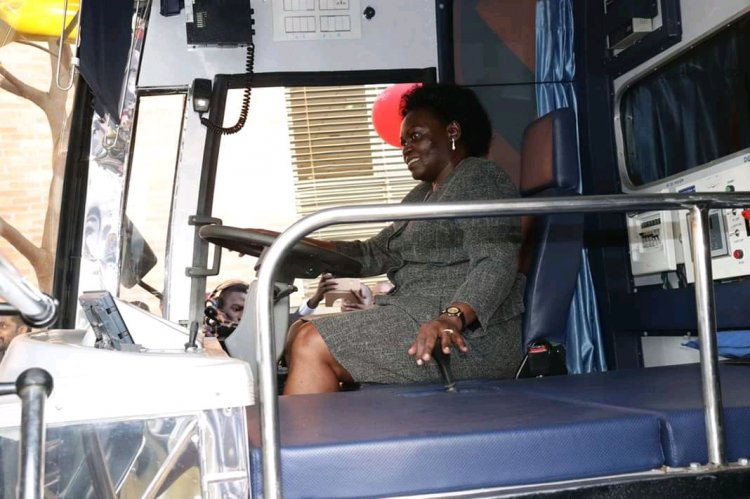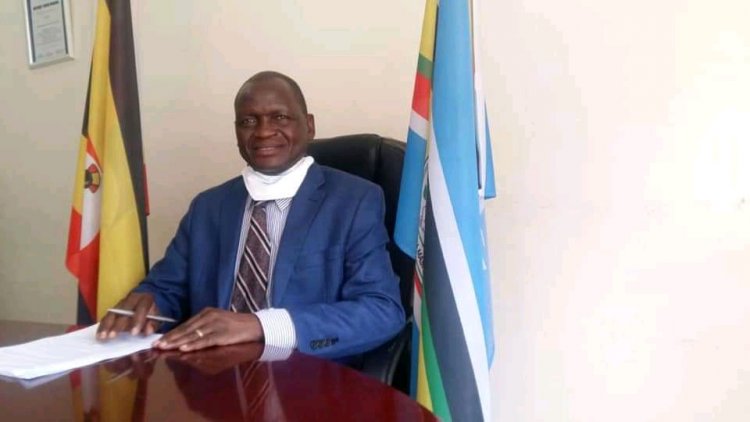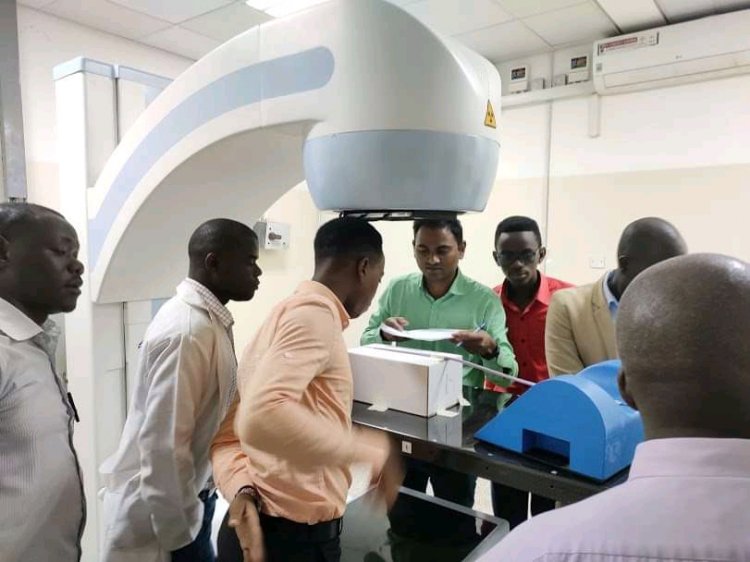UCI, Mulago hospital clarifies on the social media allegations on quality of health service delivery.
The author could have done better by crosschecking with management of these institutions and other key stakeholders on the actual facts

Uganda Cancer Institute (UCI) and Mulago National referral hospital have joint issued a statement to clarify the allegations that were placed in a social media article as false. They have advised the author of the article to have first cross-checked with the management of the two government hospital before publishing.
“We wish to applaud the author for the interest in health care service delivery in Uganda but take exception in the way he/she puts falsehoods to justify his/her interest. The author could have done better by crosschecking with management of these institutions and other key stakeholders on the actual facts, if at all the interest is to contribute towards improving health care delivery in Uganda” the statement partly reads.

ED UCI Oryem Jackson
All the 21 allegations according to the joint statement were false. They pledged continued commitment to improve service delivery in Uganda.
“We wish to reiterate our commitment to improve health care services in Uganda and our willingness to work with all stakeholders (including the author of the article) to achieve this objective” it reads.
Below is the full joint statement by the Executive Directors of UCI and Mulago hospital:
Attention is drawn to the article running in social media entitled “BITTER FACTS ABOUT MULAGO NATIONAL REFERRAL HOSPITAL” in which 21 allegations were made about Mulago National Referral Hospital. The article further makes more allegations about Kiruddu National Referral Hospital and Uganda Cancer Institute which are separate institutions.
The article touches on the same allegations which previously appeared in the media and were responded to three years ago. This casts doubt on the intention of the author.

As it is our duty to inform our esteemed clients and the general public, we wish again to respond to the 21 allegations as follows.
- The article alleges the hospital has no radiotherapy machine for cancer treatment and that all patients are referred to Agakhan Hospital in Kenya. This happened five years ago and services have been restored for three years. Radiotherapy services are offered at Uganda Cancer Institute (UCI). The Institute has six functional Radiotherapy Machines; two of them are Cobalt-60 Machines, one is a Linear Accelerator whose technology is first of its kind in Africa, one is a High Dose Rate Brachytherapy Machine and two Simulator Machines. Additionally, UCI has completed the construction of six new radiotherapy bunkers and two of these are housing the Bhabatron Cobalt-60 and Linear Accelerator Machines. The four other bunkers await additional equipment to be installed.At the moment, UCI is not referring any patients for radiotherapy treatment abroad.
- The article alleges that all private vehicles accessing the hospital pay before entering the hospital. This is not true at all. There are limited parking slots inside the hospital and quite often motorists are advised to park outside in designated areas at no cost.
- It is alleged the New Mulago which has been renovated is private 100%. This is to inform the public that New Mulago is a public hospital (fully owned by government). Currently the hospital runs a COVID treatment unit, specialised clinics and the heart institute at this facility. For the record there are no services of Obstetrics and Gynaecology therefore no deliveries. These services where shifted to Kawempe National Referral Hospital and Mulago Specialised Women and Neonatal Hospital. All services are free of charge save for a few patients who come through the private wing.
- It is alleged that Old Mulago is 95% private and Government of Uganda remaining with 5%. Old Mulago is part of Mulago National Referral Hospital which is purely a public hospital.
- The article points to having private pharmacies inside the hospital one of which is First Pharmacy. For the record, there are two private pharmacies in the hospital (First Pharmacy and Eco Pharmacy). These pharmacies are run under a Public Private Partnership to provide medicines that are not on the national essential medicines list.
- The article alleges that ministers are conniving with Mulago doctors to traffic human body parts. This would have been a very serious international criminal offence requiring criminal prosecution of offenders. This is not possible in Mulago Hospital. We therefore categorically dismiss this allegation as mere hearsay. Should anyone have information in this regard please inform Police or hospital management.
- The article alleges that pharmacies and scanning private clinics are owned by senior doctors. While it is true that these facilities exist, Mulago Hospital does not license or control them. Mulago Hospital management is not privy to the ownership of these facilities. For more information the public is encouraged to contact National Drug Authority for Pharmacies and drug shops, KCCA and respective Regulatory Councils for clinics.
- In the article it is indicated that every financial year Ministry of Health spends tax payers’ money burning expired drugs yet Mulago has no medicines. The hospital receives medicines from National Medical Stores, so it is not true that Mulago has no medicines. However, due to the complexity of diseases treated at Mulago and high patient turn up, sometimes these medicines are not enough. Therefore owing to this limitation there are no expired medicines for disposal through burning.
- The article mentions that the late Meddie Kaggwa (RIP) former Chairperson of Uganda Human Rights Commission fainted at Mulago roundabout but was instead driven 3 kilometers back to Case Clinic. The choice to go to Case Clinic must have been made by the rescuers based on other consideration other than emergency services at Mulago. The Hospital provides emergency services through Accident and Emergency Department which has two fully fledged theatres and access to radiology services. This unit admits an average of over 900 patients per month. This translates to about 10,000 per annum. For instance in October the unit admitted 939 patients and conducted 224 surgeries, in November there were 899 admissions and 191 surgeries. Therefore while the author of the article wants to create a false impression that the Hospital lacks emergency services, these statistics clearly indicate the capacity of the hospital to respond to emergencies. Indeed during the riots in November the unit successfully handled all the casualties.
- The article alleges that two health ministers are seeking medical treatment broad on tax payers’ money. Mulago National Referral Hospital is not aware of any health minster that is currently abroad for treatment.
- This article alleges that accident and mob justice victims at the emergency facility are welcomed on a bloody floor as they wait to be registered. Accident and mob justice victims are brought to the hospital when they are bleeding, therefore occasionally, it may be it may be inevitable to have a spot of blood as the procedures are being carried out. The unit has standby cleaners deployed to immediately clean the dirty surfaces. Therefore the unit is always clean.
- The article mentions that everybody that enters the hospital mortuary is charged not less than UGX.150, 000 before handing over the deceased. There are two mortuaries at the hill i.e. one run by the hospital and the other run by KCCA and Uganda Police. Currently, the Hospital mortuary labeled (Farewell Home) handles COVID-19 bodies from the COVID Treatment Unit and services are free of charge while the City Mortuary handles bodies from outside and the rest wards of in the hospital. Whoever has information to the contrary can report to KCCA , Hospital management or Police.
- The article alleges that the hospital has one if not zero brain surgery doctors. Mulago National Referral Hospital has 8 neurosurgeons and 11 in-training Neurosurgeons headed by a Senior Consultant. This team of Neurosurgeons is dedicated to saving lives at all times. For instance, in October 2020 the Neurosurgery unit admitted 174 patients and conducted 83 neurosurgeries (brain surgeries), in November 2020 there were 152 admissions and 62 surgeries. Currently, the Neurosurgery ward has over 40 patients who have had surgery.
- The article alleges that most of the work at Mulago is done by medical interns with little supervision of senior doctors. Mulago National Referral hospital is fully staffed with Senior Consultants, Consultants, and Medical Officer Special Grade who provide specialised health care services including supervision of interns. In addition Mulago also collaborates with other Institutions like Makerere College of Health Sciences and these are staffed with Professors, Lecturers and Residents. In the clinical practice interns are given more time with patients as a way of mentorship while they are being supervised by the Senior Doctors. This could have misled the author of the article to think that it is only interns working on patients.
- The article falsely claims that Doctors at Mulago and other Government Hospitals have always demonstrated over poor pay. Some health workers at Mulago participated in the national wide strike but was later resolved when Government addressed their issues through increment of salary.
- The article indicates that on many occasions UMEME and National Water have always cut off connections at Mulago due to unpaid bills. This is not true, UMEME and National Water and Sewerage connections have never disconnected Mulago National Referral Hospital over issues of accumulated water and electricity bills, save for interruptions due to technical faults and routine maintenance. As a matter of fact the Hospital is on a prepaid meter for both electricity and water and therefore the issue of accumulated bills do not arise.
- The article alleges that locals neighboring Mulago branches mostly Kiruddu Hospital have always demonstrated over bad smell and garbage at the hospitals. This used to a problem when the structure had just been opened but this has long been solved. For instance among the many measures to control the issue of smell Government of Uganda acquired a cesspool emptier which regularly empties the septic tank and the process of constructing a waste water treatment plant by National Water and Sewerage Cooperation is under way for a permanent solution. As for domestic and medical waste, the hospital contracted a service provider to routinely collect and dispose. The author portrays Kiruddu as a branch of Mulago Hospital whereas not.
- The article mentions that Mulago and all other Government Hospitals have a practice of under the table payments (KITU KIDOGO) before accessing services. The practice being alleged is criminal according to the laws of Uganda. Management of Mulago Hospital encourages the public to desist from making such payments and report to Uganda Police and Hospital Management of such incidents.
- The article alleges that at Uganda Cancer Institute, patients sleep outside on verandas and sheds. This is not true, all in-patients of UCI sleep inside the wards, not verandas. The patients seen on verandas are out-patients who are supposed to receive treatment and go back home. UCI has one hostel which accommodates 25 out patients and plans of constructing another hostel to accommodate more out-patients who are unable to go back home are underway. As a mitigation measure, UCI is collaborating with private hostels which are accommodating some patients waiting for treatment.
The institute is also setting up regional cancer centers so that patients are treated within their regions.
- In the article it is alleged that Mulago refers patients to private clinics. Mulago Hospital would like to categorically say that this not true and is unreasonable. It is important to note that Mulago Hospital can have counter referral to a lower facility if it is for purposes of follow up and accessibility like a patient who presents with a chronic severe disease may be referred to a lower health facility after stabilizing them for purposes of follow and refill of medicines.
- As already indicated in the article Mulago National Referral Hospital does not handle any deliveries. The author may wish to check with the Hospitals implied in the article to get the facts on this matter.
In conclusion we wish to applaud the author for the interest in health care service delivery in Uganda but take exception in the way he/she puts falsehoods to justify his/her interest. The author could have done better by crosschecking with management of these institutions and other key stakeholders on the actual facts, if at all the interest is to contribute towards improving health care delivery in Uganda.
We wish to reiterate our commitment to improve health care services in Uganda and our willingness to work with all stakeholders (including the author of the article) to achieve this objective.
Executive Director Executive Director
Mulago National Referral Hospital Uganda Cancer Institute












